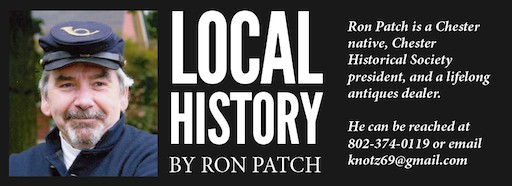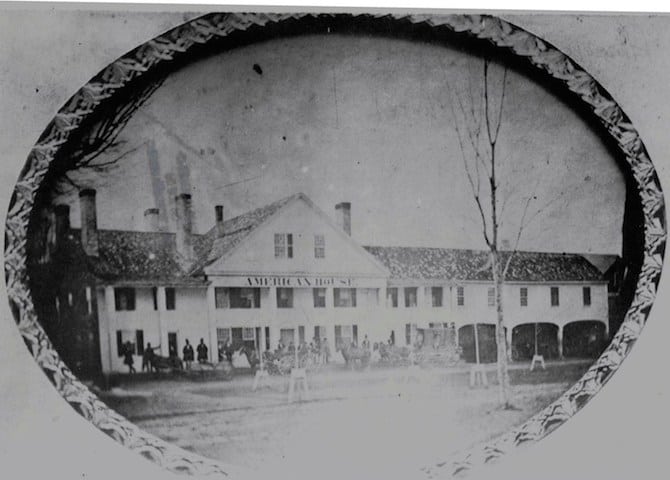
I’ve been president of the Chester Historical Society for about 15 years now. In my first year, I found the photo you see with this article. You can see the American House sign. It’s a poor quality Xerox copy but it’s what we have. The American House stood where the Fullerton is today.

I had never heard of the American House before. Sometime later I found a handwritten note that it had burned in 1858. We are compiling photos and written histories for our upcoming book, “History of Chester Fire Departments.” We wanted to include this fire in the book but had no history until now.
The Rockingham Library has many of the Bellows Falls Times online. I searched the year 1858 but found nothing. Recently Peter Farrar checked the vault at Chester Town Hall. Peter found mention of the American House being there in 1860.
I checked the Bellows Falls Times for 1860 and found the account below. It is copied as it was printed.
Bellows Falls Times, August 31, 1860, Fire in Chester – Chester House in Ashes
“A destructive fire broke out in Chester, yesterday morning about half past one o’clock – and before the flames could be stayed the Chester House and other buildings connected therewith, including the barn and livery stable, J.N. Moore’s drug store, and N. Nourse’s tailoring establishment, were a mass of smouldering ruins. Most of the contents of these buildings were saved, but of course more or less damaged.
“The fire is said to have started in the kitchen of the hotel, and was doubtless accidental. The hotel was kept by G.J. Francis Esq., whose loss must be considerable. It was owned by Mr. Whitcomb of Providence, Rhode Island, and was insured by some stock company, we have not learned where, for $3,000. We have no estimate of the loss of Dr. Moore or Mr. Nourse. The former, we understand, sent an application for insurance to the Vermont Mutual at Montpelier, last Monday. He has not heard from it, and therefore does not know, this Thursday morning, whether he is insured or not. The total loss by this fire must be from $6,000 to $10,000.
“Soon after the alarm was given, it was perceived that the buildings on either side of the Chester House would be in the most imminent danger, and messengers were despatched to Springfield and Bellows Falls, and in an hour from the time the alarm was given in this village, our fireman with their engine landed at Chester, and Springfield Torrent Company No. 3, were also there very soon after, but by the great exertions of the Chester people they had prevented the extension of the fire, and their services were not required. They were however treated with the utmost liberality by the Chester people, who opened their private houses and gave them a nice breakfast before coming home.
“Before starting from the village, the Chester people cheered the firemen from abroad, which was heartedly returned. Our company went up on a special train, and returned by the regular train in the morning.”
It wasn’t until the early 1870s that Chester had their first fire department. We will include the formation of Chester’s two fire departments in our upcoming book. When the American House burned, it would have been fought by a local bucket brigade.
In the days before fire departments, you would insure your property with a local bucket brigade or insurance company. You would be provided with a cast iron fire mark that you affixed to your building. This fire mark indicated to your local bucket brigade that you had prepaid for protection.
Today, where Bargain Corner is opposite the Whiting Library, once stood the Eagle Hotel. We have an old photo of the Eagle Hotel where you can see a belfry and large bell. This bell was the alarm of fire. This photo and relevant information will be included in our book.
Over the years, business names have changed as is evidenced here by changing American House to Chester House. This is still true today. Look at Lisai’s, now Smitty’s, as an example.
For me the major question is how many other fires of long ago are unknown today. Frank Bidwell is searching local newspapers from the early 1800s on into the 1950s. As Frank discovers these long forgotten fires, they will be copied and included in our book.
This week’s old saying is from Dudley Do-Right: “It must be true. I read it in the paper.”